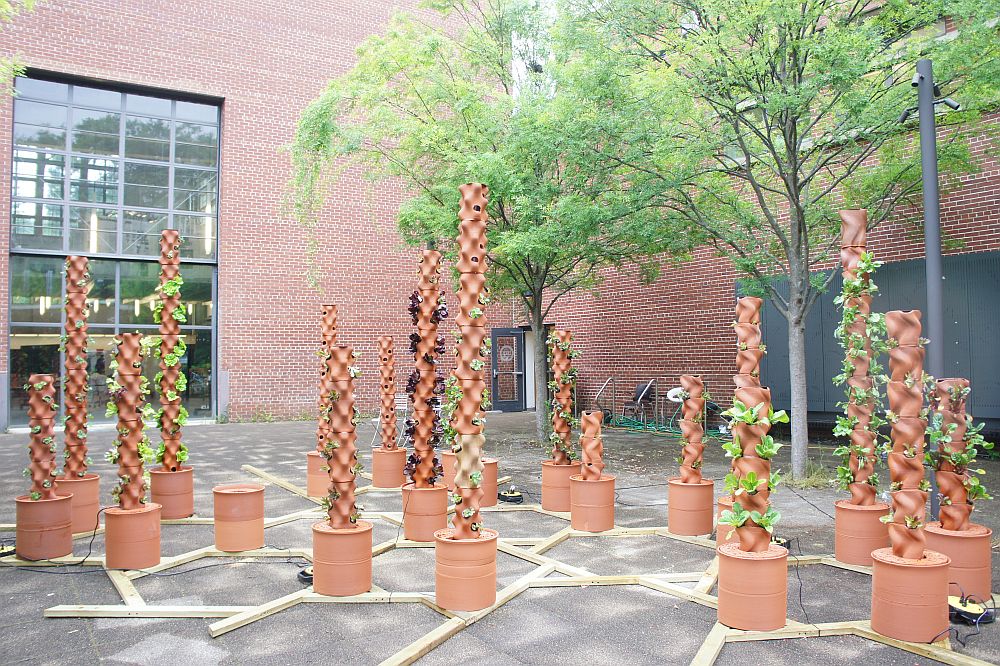
[Image above] Example of a plastic sand brick made by Gjenge Makers Ltd., a social enterprise in Kenya that aims to clean the environment while addressing affordable housing concerns in the country. Credit: Gjenge Makers Ltd, YouTube
Ever since China permanently banned the import of nonindustrial plastic waste in 2018, the failings of our recycling cycle have become jarringly apparent. (Though to call the system that handles plastic waste “recycling” is a misnomer at best.)
As public awareness of plastic waste grows, it opens doors for other packaging materials such as glass to start seeing a resurgence, a possibility we covered here and here on CTT. But using materials other than plastic for packaging solves only half the problem—we still need ways to deal with the plastic waste that already exists.
For tiny pieces of plastic waste called microplastic, breaking it down into compounds that do not pose a threat to the environment is typically the best approach, as the pieces are too small to easily collect and recycle. But even for larger pieces that are easily collected, recycling is a challenge because plastic quality degrades rapidly every time it is reheated, meaning it can only be recycled into new plastic products once or twice.
Instead of recycling plastic into new plastic products, recycling plastic into other applications can offer more final solutions. For example, we covered the unique use of fibers from recycled beverage straws to aid in refractory castable production this March.
A more common recycled plastic application is plastic bricks, or bricks in which the main material is recycled plastic. Several emerging and developing countries in recent years have established local enterprises to produce plastic-based bricks to not only clean the environment but also provide affordable alternative building materials and create job opportunities for people.
One notable example is Conceptos Plásticos, a for-profit plastic recycling company based in Colombia, South America. Their work in Colombia building housing and creating jobs for economically disadvantaged people caught the eye of UNICEF, which led to a partnership that will build a first-of-its-kind factory for producing plastic bricks in the West African country of Côte d’Ivoire.
The work of Conceptos Plásticos caught the eye of more than just UNICEF. The idea of making affordable bricks out of plastic also inspired Nzambi Matee, a Kenyan entrepreneur with a background in physics focused on materials science.
Gjenge Makers Ltd: From improper waste management to plastic sand bricks
In a video posted to YouTube in April 2018, Matee explains how plastic bricks are a “tried and tested concept” in various parts of the world, including Colombia. So she along with several colleagues decided to found the social enterprise Gjenge Makers Ltd. to bring the benefits of plastic brick production to Kenya, starting in areas near the capital Nairobi.

Credit: Gjenge Makers Ltd, YouTube
Unlike Conceptos Plásticos, which claims to make their bricks from 100% plastic, Matee says their bricks are made from mixing plastic and sand. Studies on plastic sand brick, such as here and here, found these bricks exhibit higher compressive strength and weigh less than conventional clay bricks, plus possess advantages of cost efficiency.
In early 2019, Matee and her colleagues started building the machines they would need to recycle plastic waste into bricks, and this year they officially launched the production market. Matee explains in detail the process of turning plastic into bricks in the video below.

Credit: Kenya CitizenTV, YouTube
Matee says since their launch a few months ago, “the orders that are coming will soon be almost more than what we can deliver in the market.” As such, they are exploring ways to ramp up production.
For people interested in becoming involved with Gjenge Makers Ltd., they can contact the organization here.
Author
Lisa McDonald
CTT Categories
- Environment


